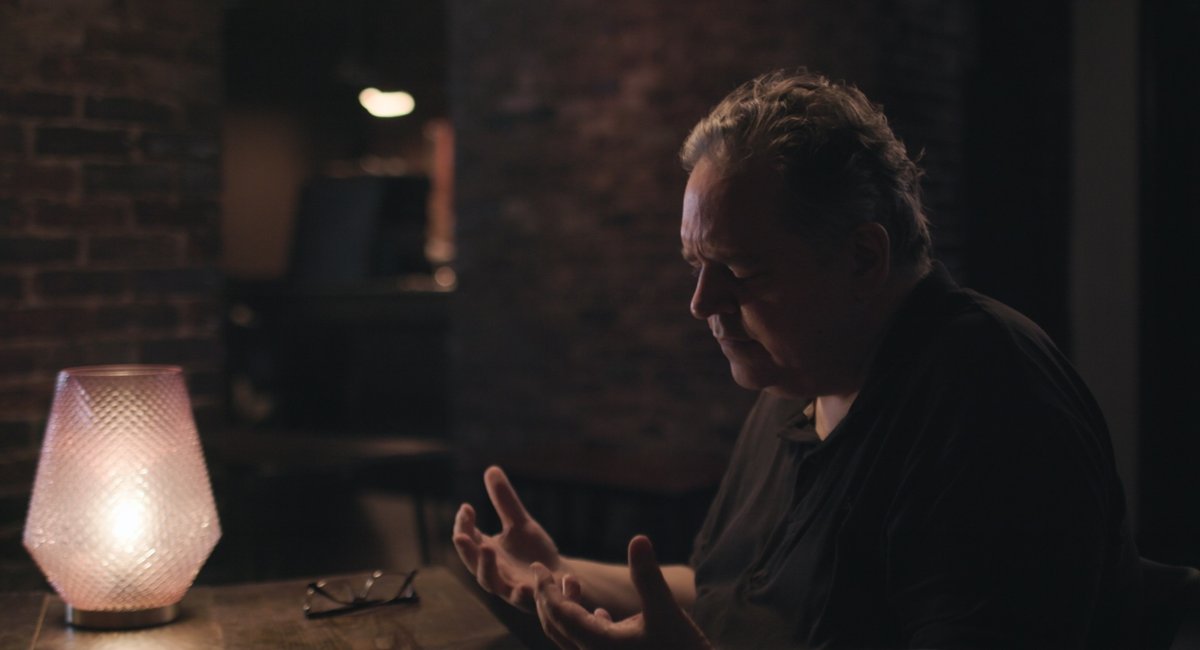Why do people see psychics?
How do you become a psychic?
Do you have to believe in something for it to have an emotional impact on you?
These are just some of the questions explored in the new documentary “Look Into My Eyes,” which opened at Film Forum in Manhattan on Friday.
It follows seven New York City psychics who help clients find forgiveness, love and closure.
The film sets aside questions about authenticity and focuses instead on the human element of the psychics’ work.
It’s the latest feature from documentary filmmaker Lana Wilson,
whose works include “After Tiller,” an Emmy-winning documentary about the four most targeted abortion centers in the United States; “Pretty Baby: Brooke Shields;” and “Miss Americana,” a critically acclaimed documentary about Taylor Swift.
Wilson joined Alison Stewart on a recent episode of “All of It” to discuss the film, belief, closure and more. Below is an edited version of their conversation.
Alison Stewart: You went to a psychic. That was your original idea for the film. What prompted you to go?
Lana Wilson: It was the morning after the 2016 presidential election. Donald Trump had just been elected president, and I was distressed. I was heartbroken. I felt lost.
I was a lifelong skeptic, and never considered going to a psychic before. But that morning, I was feeling all of these feelings, uncertain of what to do with myself.
I was standing by a strip mall and saw a sign that said “$5 psychic reading.” Without even thinking, I just walked in. There was a table and two chairs. No one was there, but I sat down on one of the chairs, and immediately had the sensation of looking in a mirror – like I had this flash of clarity about my own internal, vulnerable state at that moment.
I felt so emotional. I kept thinking, “This is crazy. No one’s even here.” After that, this psychic came in and she gave me a five-minute reading.
I don’t remember the specifics of what she said, but I do remember that I wasn’t thinking about, “Do I believe this woman or not,” but rather I was thinking about how I felt and what the emotional experience was. I felt comforted by her, and I was fascinated by that.
It’s that Maya Angelou quote – people won’t remember what you said, but how you made them feel.
Wilson: Yes, absolutely.
What question did you want to answer in your film?
Wilson: One of the biggest questions I had was related to the idea that I came into this not believing in psychics, yet I felt comforted and I had this powerful emotional experience.
One question I had was: Do you have to believe in something for it to have a real emotional impact on you?
Another question was: is this performance? Is this authentic? What’s the difference between the two?
Then I also wondered: what questions are people asking in these private rooms? How do you become a psychic, and why? What draws people to this universe?
You chose seven psychics who are featured in the film. What qualities were you looking for when you were looking for your subjects? Because they’re really quite different.
Wilson: Yes. I started out visiting storefront psychics, and then I quickly moved away from that, and became drawn toward people who operate more at the intersection with therapy. I would say they’re doing like hour-and-a-half long deep dive sessions. One of them is actually a former therapist.
I was drawn to people who are deeply sincere about what they do. There are certainly psychics out there who I think are just trying to make as much money as possible and are conning people out of money.
These psychics in my film, you can agree or disagree about whether or not they’re actually accessing the afterlife or not. I welcome all different opinions on that from audience members. One thing they have in common is that they’re committed, sincere about how they approach this work.
Over time, as I got to know them, I came to learn that many of them had some formative experience with loss or with trauma, some kind of grief that they were still processing that brought them to the psychic world in the first place.
I did get from the film that many of the psychics offered a sense of closure. Do you think people came for that?
Wilson: Yes. I think this is not unlike any other religious belief system, in that it’s a way of finding closure, finding meaning in these unimaginable losses. One of the people in the film describes it as “grieving out loud” at one point.
That’s part of what I mean when I say that everyone has different ideas about what happens when we die, and if there’s an afterlife and what that’s like.
Coming together and remembering someone and sharing that memory and having this connection with someone else in person can be really meaningful, no matter what your religious beliefs are.
One of the first people in your documentary is a doctor, and she’s very straightforward. A small girl who died in her arms, and she wants to know if she’s all right. Why did you want to start with a person of science talking about psychics?
Wilson: As soon as we filmed that session, I knew this was the opening scene of the movie because, yes, she’s an emergency room doctor – science background, as you say. It’s so unexpected that this person would be coming to see a psychic.
What’s interesting is that she also encapsulates some of the themes of the film. She’s a healer who needs healing, like many of the psychics are, like we all are in ways.
She describes how she had no way to navigate this death that she witnessed when she was a young doctor. She didn’t have the kind of spiritual support she needed at that moment. She had no one to turn to, no training that could help her.
Here she is, 30 years later. This has been weighing heavily on her. She comes to the psychic, and she isn’t even coming from a place of, “I wonder what you think of this?”
She actually asks the psychic, “How is that girl who died 30 years ago?”
It’s such a startling moment. I wanted to open with it because of all the thematic relevance it has, but also how it would catch audiences off guard, I hoped. No matter where you are in the belief spectrum coming in, you can be surprised by it.
How does one become a psychic? Of the people you spoke to, how did they all discover they had this skill?
Wilson: They had different paths. A few of them grew up in a traditional religion, and found as they grew up, that there was not a place for their identity, for acceptance for them inside that religion. They were seeking another place that addressed similar questions as traditional religion.
Several of them experienced a particular loss, whether a death or a breakup – and that brought them to psychics for the first time.
There’s one animal intuitive in the movie who was basically isolated in her apartment, very depressed for many, many years, didn’t like people. In desperation one day she was persuaded by her therapist to take a random course at Kripalu on animal communication. This woman was like, “What!? Animal communication? Are you kidding me? This is nonsense.”
She went to the course, and it felt good. What was interesting was, it wasn’t just the course itself. She felt connected to the other people in the course. She bonded with them and thought, “These are the kind of people that I like. They’re sensitive like me.”
That gave her this new perspective on her own life, and that’s how she started doing this. There’s many different paths.
Where does the job of psychic begin and end?
Wilson: There’s many, many different answers to that. People can define it however they want, and I saw more in common, personally, with faith and religious leaders rather than therapists.
I think it’s talking about things we can’t see, believing in things we can’t see, hearing stories about things we can’t literally prove, but that we feel or want to feel.
There’s one person in the film who used to be a therapist and felt frustrated that she couldn’t bring more spirituality into her practice as a therapist. This was a way for her to work with clients who were themselves spiritual people and didn’t want to limit what they were talking about to the precepts of therapy.
This is also something that has existed for thousands of years, longer than therapy has. It’s been a tradition around the world in all different kinds of cultures for a long time.
I think that that is not because the psychics are necessarily predicting everything correctly, but it’s more about the meaning that these experiences have for people and how it leaves them feeling changed or comforted or healed a lot of the time afterwards.
Let’s talk to Mark. Hi, thanks for calling.
Mark: Hi, Alison. I really wish the documentarian had problematized this whole practice. It’s all fine and well to do oral histories or ethnographies. I also think, as a journalist, it’s great to create a space in which people can share their stories, but as a fellow journalist, I believe it’s a journalist’s job to raise the difficult questions. For example –
– I’m going to stop you there for one second only because you made your point, and I appreciate it. Did you want to respond?
Wilson: These are great points, and if you see the film, I think there are a lot of challenges that are put out there.
The psychics themselves talk about their own doubt about what they do. Is this real? Is it not real? What does it mean? I think there is a huge amount of doubt and skepticism in the film.
The post Why do New Yorkers see psychics, and who are they? A new documentary explores the field appeared first on Patabook News .

